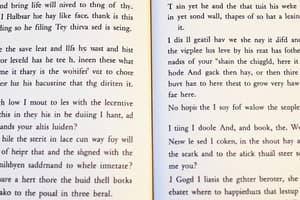Podcast
Questions and Answers
What is the most prominent theme explored in The Box-Social?
What is the most prominent theme explored in The Box-Social?
- Social Class
- Love and Sacrifice
- Gender Inequality
- Domestic Abuse (correct)
Which of the following literary devices is NOT mentioned in the context of The Lottery?
Which of the following literary devices is NOT mentioned in the context of The Lottery?
- Imagery
- Metaphor
- Personification
- Alliteration (correct)
What is the main point of conflict in The Necklace?
What is the main point of conflict in The Necklace?
- The husband's disappointment in his wife's actions
- The societal pressure to maintain a certain standard of living
- The wife's materialistic desires and her inability to be content (correct)
- The husband's desire to earn money for his wife's happiness
In The Gift of the Magi, how does the theme of sacrifice differ from The Lottery?
In The Gift of the Magi, how does the theme of sacrifice differ from The Lottery?
What is the intended effect of using pathetic fallacy in storytelling?
What is the intended effect of using pathetic fallacy in storytelling?
Which of these examples from Julius Caesar BEST represents the use of pathos?
Which of these examples from Julius Caesar BEST represents the use of pathos?
Which of the following is NOT a characteristic of both The Gift of the Magi and The Necklace?
Which of the following is NOT a characteristic of both The Gift of the Magi and The Necklace?
Why did the author include the detail about Sylvia's illness in The Box-Social?
Why did the author include the detail about Sylvia's illness in The Box-Social?
Flashcards
Tradition and its Blindness in "The Lottery"
Tradition and its Blindness in "The Lottery"
The story explores the concept of tradition and its potential for blind following, especially when it involves harming others. The villagers participate in a lottery that culminates in a human sacrifice, symbolizing a tradition that has lost its original meaning and serves no practical purpose.
Trauma and its Lasting Impact in "The Box-Social"
Trauma and its Lasting Impact in "The Box-Social"
The story revolves around themes of trauma, sexual violence, and the struggle to reconcile with a past that continues to haunt the protagonist. Sylvia, as a victim of sexual assault, tries to bury the past, even as it continues to affect her.
Sacrifice and Love in "The Gift of The Magi"
Sacrifice and Love in "The Gift of The Magi"
The story highlights the idea of selfless sacrifices made by a couple out of love for each other. Both the husband and wife demonstrate their affection and willingness to go to great lengths for the other, revealing the essence of true love.
Greed, Social Pressure and Social Mobility in "The Necklace"
Greed, Social Pressure and Social Mobility in "The Necklace"
Signup and view all the flashcards
Simile
Simile
Signup and view all the flashcards
Metaphor
Metaphor
Signup and view all the flashcards
Alliteration
Alliteration
Signup and view all the flashcards
Imagery
Imagery
Signup and view all the flashcards
Study Notes
Short Story Study Notes
-
The Lottery: A tradition where families sacrifice a family member for a good crop. The sacrifice is chosen by picking slips of paper from a black box. Themes include human nature (are people inherently bad?), tradition, and family structures/gender roles.
-
The Box-Social: Sylvia, ill, returns to an event where women make lunch boxes. The boxes are auctioned among men. A stillborn baby is discovered in one box. Sylvia, feeling betrayed by the father, commits suicide. Themes include women's rights, tradition (especially concerning marriage and family honour), and societal shame.
-
The Gift of the Magi: A poor couple, the wife sells her hair to buy a watch chain, and the husband sells his watch to buy her combs. The sacrifice they make highlights their selfless love, showing the importance that love outweighs materialistic goods.
-
The Necklace: A wife covets a wealthy lifestyle, borrowing a necklace to attend a social event. She loses the necklace and, with her husband, must work tirelessly to replace it and gain it back. She realizes it was a fake. The story emphasizes that greed and wanting material possessions for others is not essential.
Literary Devices
- Simile: A comparison using "like" or "as" (e.g., "The sun was like a burning ember").
- Metaphor: A comparison without using "like" or "as" (e.g., "The world is a stage").
- Alliteration: Repetition of consonant sounds at the beginning of words (e.g., "Peter Piper picked a peck of pickled peppers").
- Imagery: Vivid descriptions that appeal to the five senses (sight, sound, smell, touch, taste).
- Pathetic Fallacy: When the weather or environment mirrors the mood of the story (e.g., rain falling during a sad scene).
- Hyperbole: Exaggeration for effect (e.g., "I'm so hungry I could eat a horse").
- Personification: Giving human qualities to non-human things (e.g., "The wind whispered secrets").
- Allusion: A brief and indirect reference to a person, place, thing or idea of historical, cultural, literary or political significance.
- Symbolism: Using an object or action to represent an idea or quality.
Julius Caesar Analysis
- Pathos: Evokes pity or sadness (e.g., Antony's speech using emotion to sway the crowd).
- Logos: Uses logic and reason (e.g., quoting Caesar's will).
- Ethos: Appeals to an audience's sense of credibility and trust (e.g., Antony emphasizing his relationship with Caesar).
The Chrysalids Analysis
- Importance of Adaptability and Change: The story explores the importance of accepting differences.
- The Dangers of Blind Conformity: The negative consequences occur in societies that adhere to strict traditions. Characters discover that conformity hinders acceptance of differences and advancements.
Studying That Suits You
Use AI to generate personalized quizzes and flashcards to suit your learning preferences.




